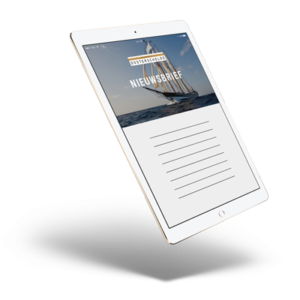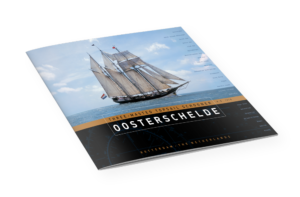06 Dec A log entry and a story about Cape Horn, the Sirens and the Harmonica
A log entry and a story about Cape Horn, the Sirens and the Harmonica
6 December 2013
Phill reports: “Our great voyage is nearing its end. Yesterday at 09.45 we crossed the 50th parallel in the Atlantic Ocean, thus fulfilling the requirements of the Cape Horn society: to sail a commercial sailing vessel for 3,000 miles, without using the engine, from 500 south in the Pacific to 500 south in the Atlantic.
This milestone was fittingly celebrated by a long sounding of ‘Oosterschelde’ horn, a Latin verse from Jimbo to acknowledge the good seamanship of her crew, a short speech from Captain Arian and a hearty toast of beerenburg. Proost!
Last night saw more festivity with the traditional Dutch celebration of pakjesavond Sinterklaas (perhaps the original Secret Santa?) The evening started with delicious pastries from our talented chef, Job. Then, to loud singing from the eager ships company, Saint Nicolas himself (a.k.a. Leo), arrived in full regalia, all the way from Spain, accompanied by his erstwhile helper, Pedro (a.k.a. Jan), to hand out gifts to all on board. Each person was grilled by the legal-eagle mind of St. Nic before he deigned to hand him or her his or her gift. Each gift contained an appropriate poem, which was read out by the recipient to the enjoyment of all.
A further milestone was reached this morning at 04.30 when Leo sighted the northwest islands of the Falklands. The end of our voyage is now in sight! What emotions will surface when we finally anchor? However, we were not to make anchorage easily! By lunch time the wind piped up to F7-8 from the south as we tacked southwards for Port Egmont, Saunders Island.
It was a long slow haul to windward, accompanied by many black & white Commersons dolphins as we neared the land. Finally, at 18.00, 37 days after leaving Auckland, we anchored off the small village at Sealers Cove and retired below for another of Jobs famous feasts to mark the end of our long sojourn from New Zealand.
Looking back through the log, I was delighted by Martins entry regaling us with the legend of the Sirens of Cape Horn. Fortunately, in the tradition started by a humble Spanish seaman, I came prepared for such perils, thanks to the story of this early Cape Horn survivor.
The story is recorded in the journal of one Philippe Harmonico, a Spanish seaman who’d been marooned on Tierra del Fuego by Ferdinand Magellan (Magallan) for insubordination. Fortunately for all sailors, a ship of the Conquistadors later rescued Philippe Harmonico and his story is told to this day:
While struggling to survive the wilds of Tierra del Fuego and avoid its fearful aborigines, Philippe was tortured at night by the alluring calls of the Sirens. His only solace came from comforting himself with the dulcet tones of his own musical talent, playing a small musical instrument which he and his German cousin, Hohner, had invented and which bore his name, ‘Harmonica’ (in Spanish, the feminine a‚ applies to all musical instruments).
Philippe discovered that a few bars on his harmonica would confound the Sirens, driving them to distraction such that they would flee into the mountains of Tierra del Fuego, from whence they could no longer be heard.
From that time on, thanks to the writings of Phil Harmonico, all good captains on the Cape Horn route take pains to ensure that at least one crew member can ward off the treacherous Sirens by playing the harmonica.
Thus armed, I have protected ‘Oosterschelde’ on our great voyage.”





